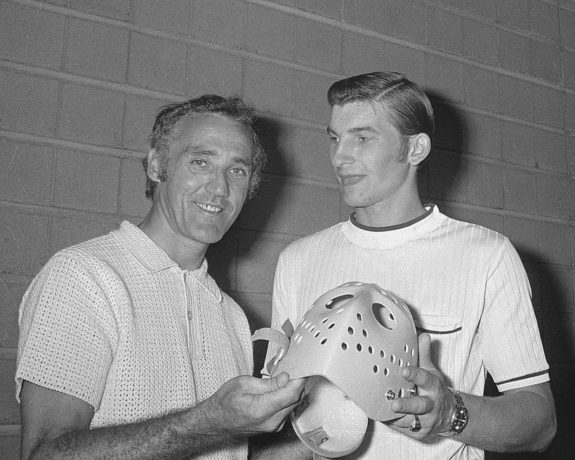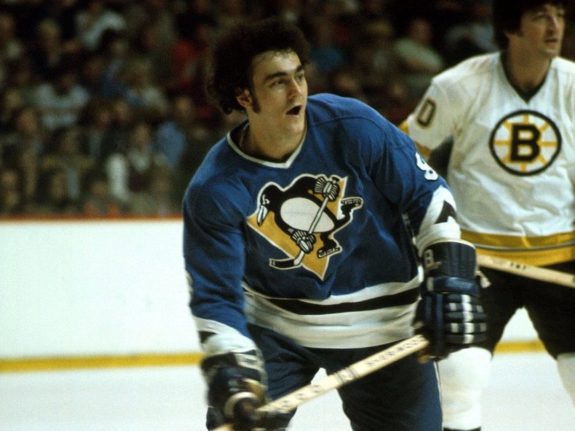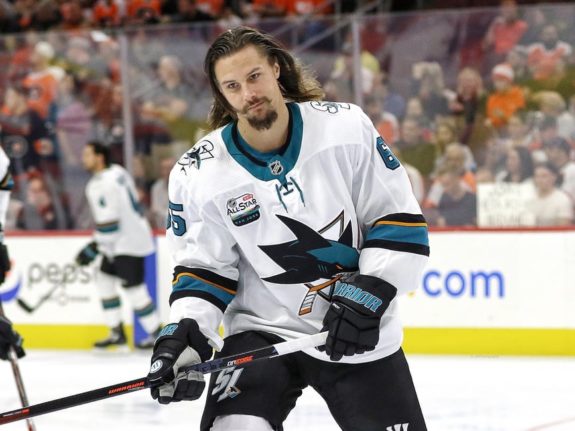Yesterday in Hockey History: Sept. 12
Tomorrow in Hockey History: Sept. 14
Sept. 13 has been a huge date on the international stage as Canada, and the Soviet Union battled each other numerous times. Some of the biggest names in NHL history had the honor of playing for their country on this date. Also, an impressive Hall of Fame class was inducted and a superstar blueliner was traded across the continent. So, let’s begin our daily trip back in time to revisit all the great memories.
Canada/USSR Rivalry Renewed
A Soviet Blowout
There have been three big Canada Cup games played between Canada and the Soviet Union on this date over the years. The first took place on Sept. 13. 1981, at the Montreal Forum with the two hockey powerhouses meeting in the one-game championship final.
This was a rematch from the final game of the round-robin, which saw Canada beat the Soviets 7-3. Canada then beat the United States 4-1 in the semifinals, with the Soviet Union beating Czechoslovakia by the same score.
The USSR opened the scoring early in the second period with a goal from future NHLer Igor Larionov. Clark Gillies tied the game less than four minutes later, with his New York Islanders teammates Mike Bossy and Bryan Trottier picking up the assists.

It was all downhill from here for the Canadians as the Soviet Union scored three more goals before the end of the second period and another four in the third for the 8-1 blowout victory. Goaltender Vladislav Tretiak made 25 saves on his way to winning the Most Valuable Player of the Tournament honors.
Paul Coffey’s OT Heroics
Team Canada got revenge three years later, on Sept. 13, 1984, by beating the Soviet Union in the semifinals. The Soviets beat Canada, 6-3, in round-robin play three days earlier. The two rivals met in the second semifinal at the Saddledome in Calgary, with Sweden waiting to take on the winner.
John Tonelli’s power-play goal midway through the second period gave Canada a 1-0 advantage through 40 minutes. The Soviets got goals from Sergei Svetlov and Sergei Makarov within the first seven minutes of the final frame. With just over six minutes to play in regulation, defenseman Doug Wilson received a feed from Wayne Gretzky and forced overtime.

Canada received an early power play in overtime but did not convert. Later in the extra session, the Soviet Union got a 2-on-1 break, but defenseman Paul Coffey broke up a pass and started a counterattack. Bossy got to the front of the net and deflected Coffey’s shot from the point for the game-winning goal. Canada went on to sweep Sweden in the best-of-three championship final to win the tournament.
Super Mario’s Hat Trick
Finally, on Sept. 13, 1987, these two teams met in what some feel is the greatest game ever played in hockey history. This time, Hamilton, Ontario, was the site of Game 2 of the best-of-three championship final. The Soviet Union was running high after their 6-5 overtime victory in the first game of the series.
The game got off to a furious start, with defenseman Normand Rochefort giving Canada a 1-0 just 43 seconds after the opening faceoff. Andrei Khomutov answered for the USSR less than a minute later before Doug Gilmour gave Canada a 2-1 lead at the 3:48 mark. Coffey scored nine minutes later to take a 3-1 lead into the first intermission.
Slava Fetisov and Vladimir Krutov scored two minutes apart to tie the game midway through the second period. However, the game stayed even for just over two minutes before Mario Lemieux struck to give Canada a 4-3 lead.
Viacheslav Bykov knotted the game at 4-4 early in the second period, but Lemieux scored again, this time on the power play, to give Canada a 5-4 advantage with just under 10 minutes to play. Valeri Kamensky forced overtime, with just over a minute to play, by scoring off an end-to-end rush.
Grant Fuhr had to show off his Hall of Fame skills during the first overtime to keep the game alive. Just past the 10-minute mark of the second overtime, Lemieux beat goaltender Evgeny Belosheikin to complete his hat trick and force a third and final game.
Gretzky had the primary assist on the play. He had assists on every Canadian goal except for the opening tally.
A New Hall of Fame Class
The Hockey Hall of Fame inducted a new class on Sept. 13, 1978. The group of six included players Andy Bathgate, Jacques Plante and Marcel Pronovost as well as builders Jack Bickell, Sam Pollock and William Tutt.
Bathgate played in 1,069 NHL games during his 17-season NHL career, scoring 349 goals and 973 points. The right winger spent most of his career with the New York Rangers, where he won the Hart Trophy (league MVP) in 1958-59 for scoring 40 goals and 88 points in 70 games. Late in the 1963-64 season, he was traded to the Toronto Maple Leafs and won the lone Stanley Cup of his career. He also spent time with the Detroit Red Wings, Pittsburgh Penguins, and Vancouver Blazers of the World Hockey Association (WHA) before retiring in 1975.
Plante is regarded as one of the best goaltenders in league history. He won 314 games and six Stanley Cups with the Montreal Canadiens between 1953 and 1963. He won seven Vezina Trophies, which, at the time, was given to the goaltender who allowed the fewest goals. He won the Hart Trophy for winning 42 games and posting a .923 save percentage (SV%) and 2.37 goals-against average (GAA).
After being traded to the Rangers in 1963, Plante retired but returned in 1968 to the St. Louis Blues, where he went to back-to-back Stanley Cup Finals. He spent time with the Maple Leafs and Boston Bruins before one final professional season, in 1974-75, with the Edmonton Oilers in the WHA. Plante was the first goaltender to wear a mask fulltime in the NHL.

Pronovost played 1,206 games in the NHL, with the first 983 coming in a Red Wings uniform. The talented defenseman won four Stanley Cups in his 15 seasons in Detroit. Following the 1964-65 season, he was traded to the Maple Leafs in a deal that included Bathgate going to the Red Wings. He won a fifth Stanley Cup with Toronto in 1967. Pronovost played five seasons in Toronto before retiring in 1970.
Bickell was known for his association with the Maple Leafs as the owner, president, chairman, and director between 1924 and 1951. Pollock was the general manager of the Canadiens for 14 seasons in which they won nine Stanley Cups. Tutt was a longtime executive for various leagues and organizations, including serving as president of the International Ice Hockey Federation (IIHF).
Odds & Ends
The Maple Leafs traded forward Rick Kehoe on Sept. 13, 1974, to the Penguins for winger Blaine Stoughton and a first-round pick. Kehoe scored 312 goals and 636 points, in 722 games, over his 11 seasons in Pittsburgh. Stoughton played in two seasons for the Maple Leafs, scoring 29 goals, before heading to the WHA.

The Leafs used that first-round pick in 1977 (12th overall) to select defenseman Trevor Johansen, who played in 132 games over two stints with the team.
On this same day, the Islanders acquired the NHL rights to Bob Bourne, from the Kansas City Scouts, in exchange for Larry Hornung and Bart Crashley. Bourne scored 238 goals and 542 points in 814 games for New York and was part of all four of their Stanley Cup wins in the 1980s.
On Sept. 13, 1983, the Canadiens signed undrafted free agent Brian Skrudland. He eventually made the NHL in 1985 and is best remembered for scoring the fastest overtime goal in Stanley Cup Final history.
The Chicago Blackhawks beat the Canadiens 5-4, on Sept. 13, 1992, in their second of two exhibition games in London, England. The game was decided in a shootout, something that does not become a regular thing in the NHL until 2005.
The Bruins signed free agent Joe Mullen on Sept. 13, 1995, after spending the previous five seasons with the Penguins. The future Hall of Famer was limited to just 37 games in his lone season with Boston, scoring eight goals and 15 points.
After months of rumors and speculation, the Ottawa Senators finally traded Erik Karlsson on Sept. 13, 2018. The star defenseman was sent to the San Jose Sharks, with Francis Perron, for Chris Tierney, Rudolfs Balcers, Dylan DeMelo and Joshua Norris.

The two-time Norris Trophy winner has played 293 games for the Sharks in the last five seasons and scored 52 goals and 243 points, including a monster 25 goals and 101 points in 2022-23 where he won his third Norris Trophy. He was traded to the Pittsburgh Penguins in the 2023 offseason.
Happy Birthday to You
A grand total of 23 current and former NHL players have been born on this date. The first was Harold Darragh, who was born on Sept. 13, 1902. He played in 307 NHL games between 1926 and 1933, scoring 68 goals and 117 for four different teams. The most recent is St. Louis Blues center Alex Texier, turning 26 today, who made his NHL debut in 2019.
Emile Francis was born on Sept. 13, 1926, but he is hardly remembered for his 95 games in the NHL. He was inducted into the Hockey Hall of Fame for his work as a coach and general manager. He became general manager of the Rangers in 1964 and became their head coach the following season, leading them to a very successful run.

After being fired in New York, in 1976, he became general manager of the Blues where he also had two stints as head coach. He ended his long hockey career with 10 seasons as general manager and president of the Hartford Whalers before retiring in 1993.
Other notable players born on this date include Igor Kravchuk (59), Ted Drury (54), Craig Rivet (51), Jose Theodore (49), Michael Houser (33), Mark Jankowski (31), Miles Wood (30), Adrian Kempe (29), and Alex Formenton (26).
*Originally constructed by Greg Boysen
